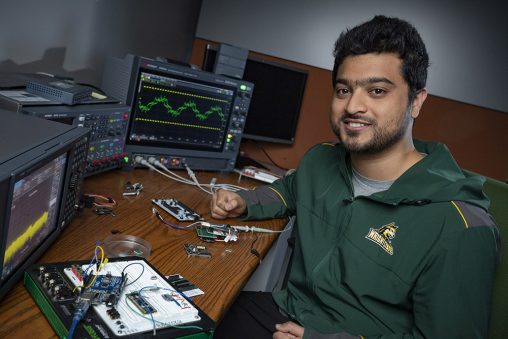
From teaching graduate-level courses to researching hardware security, Sayed Nowroz’s Wright State education has prepared him for a pivotal role in developing Amazon’s next-generation AI computing infrastructure. (Photo by Erin Pence)
Wright State University graduate student Sayed Nowroz is making an impact at the forefront of artificial intelligence innovation. As a key contributor to the development of advanced infrastructure powering AI systems like ChatGPT, Nowroz’s work is helping shape the future of technology.
During an internship with Amazon Web Services (AWS) and Annapurna Labs in Austin, Texas, he played a vital role in designing cutting-edge cloud hardware that is making AI more accessible and affordable than ever before.
“If Amazon Web Services is an infrastructure company, think of Annapurna Labs as the infrastructure provider of AWS,” Nowroz said. “It’s at the forefront of hardware/software co-design, not just in Amazon Web Services, but also across the entire industry.”
His work through Annapurna Labs involved developing custom silicon chips, graphics and artificial intelligence accelerators and server computers that form AWS’s cloud foundation. His work helped save AWS customers thousands of dollars by creating more efficient AI processing systems.
Nowroz said AI services such as ChatGPT require tremendous computing power. Amazon is the biggest cloud computing provider for companies and services like these.
His internship had an even bigger impact on his future.
He is set to join Amazon Web Services as an application-specific integrated circuit (ASIC) hardware development engineer after graduating from Wright State this spring with a master’s degree in computer engineering.
To work as an ASIC engineer, Nowroz said he needed a strong knowledge of electronics, electronics manufacturing services, circuit design, computer architecture and code.
Nowroz enrolled at Wright State to get a high-level perception of what the world needs in the next five years.
“I understood that the world was moving towards edge computing, I knew that was the next big thing,” he said.
During his time at Wright State, Nowroz has enriched his education by assisting with teaching graduate-level courses in Embedded Systems Engineering and working as a graduate research assistant in the Semiconductor Microelectronics Security, Assurance, Resilience and Trust (SMART) Cybersecurity Research Lab with his advisor, Fathi Amsaad, Ph.D., assistant professor of computer science and engineering.
Nowroz said working with Amsaad gave him hands-on research experience in hardware security.
“Working with him was a good opportunity to expand my skills in both hardware and AI,” Nowroz said.
The experience also helped him realize that engineering is not limited to a specific domain. While he earned a bachelor’s degree in electrical engineering, Nowroz has since expanded his interest from building circuits to writing software and developing physical hardware.
As Nowroz prepares to graduate and begin his professional career, his story exemplifies how Wright State students contribute to technological innovations, one silicon chip at a time.

 Walking through open doors
Walking through open doors  Adventures await
Adventures await  Wright State to expand nursing facilities to meet workforce needs and prepare more graduates for in-demand careers
Wright State to expand nursing facilities to meet workforce needs and prepare more graduates for in-demand careers  Wright State student-athletes make a lasting impact on local family with more to come
Wright State student-athletes make a lasting impact on local family with more to come  Wright State names Rajneesh Suri dean of Raj Soin College of Business
Wright State names Rajneesh Suri dean of Raj Soin College of Business 